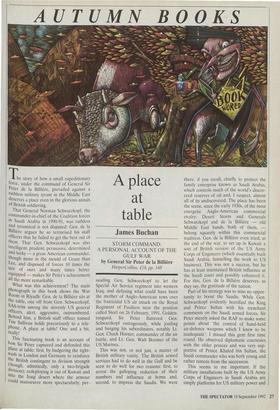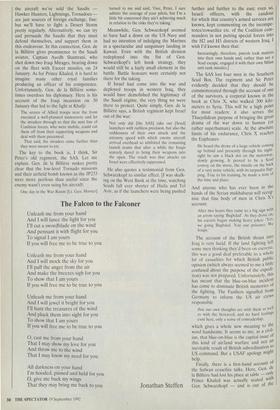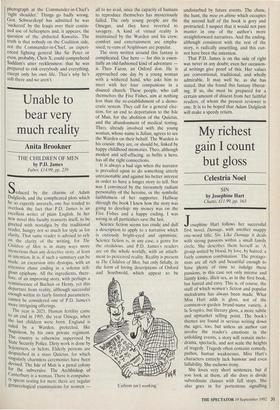AUTUMN BOOKS
A place at table
James Buchan
STORM COMMAND: A PERSONAL ACCOUNT OF THE GULF WAR by General Sir Peter de la Billiere HarperCollins, 178, pp. 348 The story of how a small expeditionary force, under the command of General Sir Peter de la Billiere, prevailed against a ruthless military tyrant in the Middle East deserves a place even in the glorious annals of British soldiering. That General Norman Schwarzkopf, the commander-in-chief of the Coalition forces in Saudi Arabia in 1990-91, was ruthless and tyrannical is not disputed: Gen. de la Billiere argues he so terrorised his staff officers that he failed to get the best out of them. That Gen. Schwarzkopf was also intelligent, prudent, persuasive, determined and lucky — a great American commander, though more in the mould of Grant than Lee, and disposed of forces 10 times the size of ours and many times better equipped — makes Sir Peter's achievement all the more remarkable.
What was this achievement? The main photograph in this book shows the War Room in Riyadh: Gen. de la Billiere sits at the table, one off from Gen. Schwarzkopf, SAS-trim among the slovenly US general officers, alert, aggressive, outnumbered. Behind him, a British staff officer named Tim Sullivan holds precariously to a tele- phone. A place at table! One and a bit, really!
This fascinating book is an account of how Sir Peter captured and defended this Place at table: first, by badgering the tight- wads in London and Germany to reinforce the British contingent to division strength (though, admittedly, only a two-brigade division); redeploying it out of Kuwait and into the Iraqi desert where the armour Could manoeuvre more spectacularly; per-
suading Gen. Schwarzkopf to let the Special Air Service regiment into western Iraq; and defusing what could have been the mother of Anglo-American rows over the fratricidal US air attack on the Royal Regiment of Fusiliers near the position called Steel on 26 February, 1991. Golden- tongued, Sir Peter flattered Gen. Schwarzkopf outrageously, while jostling and barging his subordinates, notably Lt. Gen. Chuck Homer, commander of the air battle, and Lt. Gen. Walt Boomer of the US Marines.
This was not, or not just, a matter of British military vanity. The British armed services had to do well in the Gulf and be seen to do well for two reasons: first, to arrest the galloping reduction of their numbers and influence at home and, second, to impress the Saudis. We were there, if you recall, chiefly to protect the family enterprise known as Saudi Arabia, which controls much of the world's discov- ered reserves of oil and, I suspect, almost all of its undiscovered. The place has been the scene, since the early 1930s, of the most energetic Anglo-American commercial rivalry: Desert Storm and Generals Schwarzkopf and de la Billiere — old Middle East hands, both of them, belong squarely within this commercial tradition. Gen. de la Billiere even tried, at the end of the war, to set up in Kuwait a sort of British version of the US Army Corps of Engineers (which essentially built Saudi Arabia, funnelling the work to US business). This was not a success, but he has at least maintained British influence at the Saudi court and possibly enhanced it. For this, Gen. de la Billiere deserves, as they say, the gratitude of the nation.
Part of his strategy was to miss no oppor- tunity to boost the Saudis. While Gen. Schwarzkopf evidently horrified the King and Prince Sultan with his trenchant comments on the Saudi armed forces, Sir Peter merely asked the RAF to make some points about 'the control of hand-held air-defence weapons which I knew to be inadequate': I missed this gem first time round. He observed diplomatic courtesies with the older princes and was very sup- portive of Prince Khaled bin Sultan, the Saudi commander who was both young and rather remote from the succession.
This seems to me important. If the military installations built by the US Army Corps of Engineers in Saudi Arabia are simply platforms for US military power and
the aircraft we've sold the Saudis
_
Hawker Hunters, Lightnings, Tornadoes are just sources of foreign exchange, fine: but we'll have to fight a Desert Storm pretty regularly. Alternatively, we can try and persuade the Saudis that they must defend themselves, and support them in this endeavour. In this connection, Gen. de la Billiere gives prominence to the Saudi aviator, Captain Ayedh Shamrani, who shot down two Iraqi Mirages, bearing down on the fleet with Exocet missiles, on 24 January. As for Prince Khaled, it is hard to imagine many other royal families producing an officer of his competence. Unfortunately, Gen. de la Billiere some- times overdoes his diplomacy. Here is his account of the Iraqi incursion on 30 January that led to the fight at Khafji:
The screen of Allied troops near the front executed a well-planned manoeuvre and let the invaders through so that the next line of Coalition forces, who were mobile, could cut them off from their supporting weapons and deal with them piecemeal.
That said, the invaders came further than they were meant to etc
The key to the book is, I think, Sir Peter's old regiment, the SAS. Let me explain. Gen. de la Billiere makes pretty clear that the low-level Tornado missions and their airfield bomb known as the JP233 were more perilous than useful since the enemy wasn't even using his aircraft:
One day in the War Room [Lt. Gen. Horned turned to me and said. 'Gee Peter. I sure admire the courage of your pilots, but I'm a little bit concerned they ain't achieving much in relation to the risks they're taking.'
Meanwhile, Gen. Schwarzkopf seemed to have had a down on the US Navy and had no intention of indulging the Marines in a spectacular and sanguinary landing in Kuwait. Even with the British division redeployed into the fist of Gen. Schwarzkopfs left hook strategy, they would still be a fairly small element in the battle. Battle honours were certainly not there for the taking.
If Israel had come into the war and deployed troops in western Iraq, they would have demolished the legitimacy of the Saudi regime, the very thing we were there to protect. Quite simply, Gen. de la Billiere says, a British regiment kept Israel out of the war:
Not only did [the SAS] take out [Scud] launchers with ruthless precision, but also the suddenness of their own attack and the uncanny speed with which enemy aircraft arrived overhead so inhibited the remaining launch teams that after a while the Iraqis scarcely dared to bring their weapons into the open. The result was that attacks on Israel were effectively suppressed.
He also quotes a testimonial from Gen. Schwarzkopf to similar effect. [I was skulk- ing on the West Bank at the time, watching Scuds fall ever shorter of Haifa and Tel Aviv, as if the launchers were being pushed
Unleash me from your hand And I will jewel it bright for you I'll hunt the treasures of the wind And pluck them into sight for you To show that I am yours If you will free me to be true to you 0, cast me from your hand That I may show my love for you And throw me to the wind That I may know my need for you All darkness on your hand I'm hooded, pinned and held for you 0, give me back my wings That they may bring me back to you
Jonathan Steffen
The Falcon to the Falconer
Unleash me from your hand And I will lance the light for you I'll cut a swordblade on the wind And pennant it with flight for you To signal I am yours If you will free me to be true to you Unleash me from your hand And I will mock the sky for you I'll pull the anger from the air And make the breezes sigh for you To show that I am yours If you will free me to be true to you further and further to the east; even 50,
further further
Israeli officers, with the candour for which that country's armed services are known, kept commenting on the incompe- tence/cowardice etc. of the Coalition com- manders in not putting special forces into the H2 and H3 districts of western Iraq. I wish I'd known then that: Increasingly, therefore, patrols took matters into their own hands and, rather than see a Scud escape, engaged it with their own Milan anti-tank missiles.] The SAS lost four men in the Southern Scud Box. The regiment and Sir Peter evidently decided that they should be commemorated through the account of one of the survivors, a corporal known in the book as Chris X, who walked 300 kilo- meters to Syria. This will be a high point for most readers: it also serves the Thucydidean purpose of bringing the great drama of the war down to human (or rather superhuman) scale. At the absolute limits of his endurance, Chris X reaches the Euphrates: He heard the drone of a large vehicle coming up behind and presently through his night- sight he saw a black dot on the motorway, slowly growing. It proved to be a Scud convoy on the move, the missile on the back of a very noisy vehicle, with its tarpaulin flap- ping. True to his training, he made a note of the time and place. And anyone who has ever been in the hands of the Syrian mukhabarat will recog- nise that fine body of men in Chris X's account: After two hours they came to a big sign with an arrow saying 'Baghdad'. As they drove on, his escorts began making heavy jokes: 'Yes. we going Baghdad. You our prisoner. We Iraqis.'
The account of the British thrust into Iraq is very lucid. If the land fighting left some men thinking they'd been on exercise. this was a good deal preferable to a whole lot of casualties for which British public opinion (which always seemed to me a little confused about the purpose of the expedi- tion) was not prepared. Unfortunately, this has meant that the blue-on-blue incident has come to dominate British memories of the fighting. The Fusiliers signalled from Germany to inform the US air crews responsible that our own thoughts are with them as well as with the bereaved, and no hard feelings exist here, only a sense of comradeship, which gives a whole new meaning to the word handsome. It seems to me, as a civil- ian, that blue-on-blue is the capital issue of this kind of air/land warfare and not an inevitable result of British subordination to US command. But a USAF apology might help.
Finally, there is a first-hand account of the Safwan ceasefire talks. Here, Gen. de la Billiere had lost his place at table — only Prince Khaled was actually seated with Gen. Schwarzkopf — and is out of the photograph at the Commander-in-Chiefs `right shoulder.' Things go badly wrong. Gen. Schwarzkopf has admitted he was 'suckered' by the Iraqis over their contin- ued use of helicopters and, it appears, the question of the abducted Kuwaitis. The truth is that nobody on the Coalition side, not the Commander-in-Chief, an experi- enced fighting general like Sir Peter or even, probably, Chris X, could comprehend Saddam's utter recklessness: that he was prepared to risk everybody and everything, except only his own life. That's why he's still there and we aren't.




























































 Previous page
Previous page